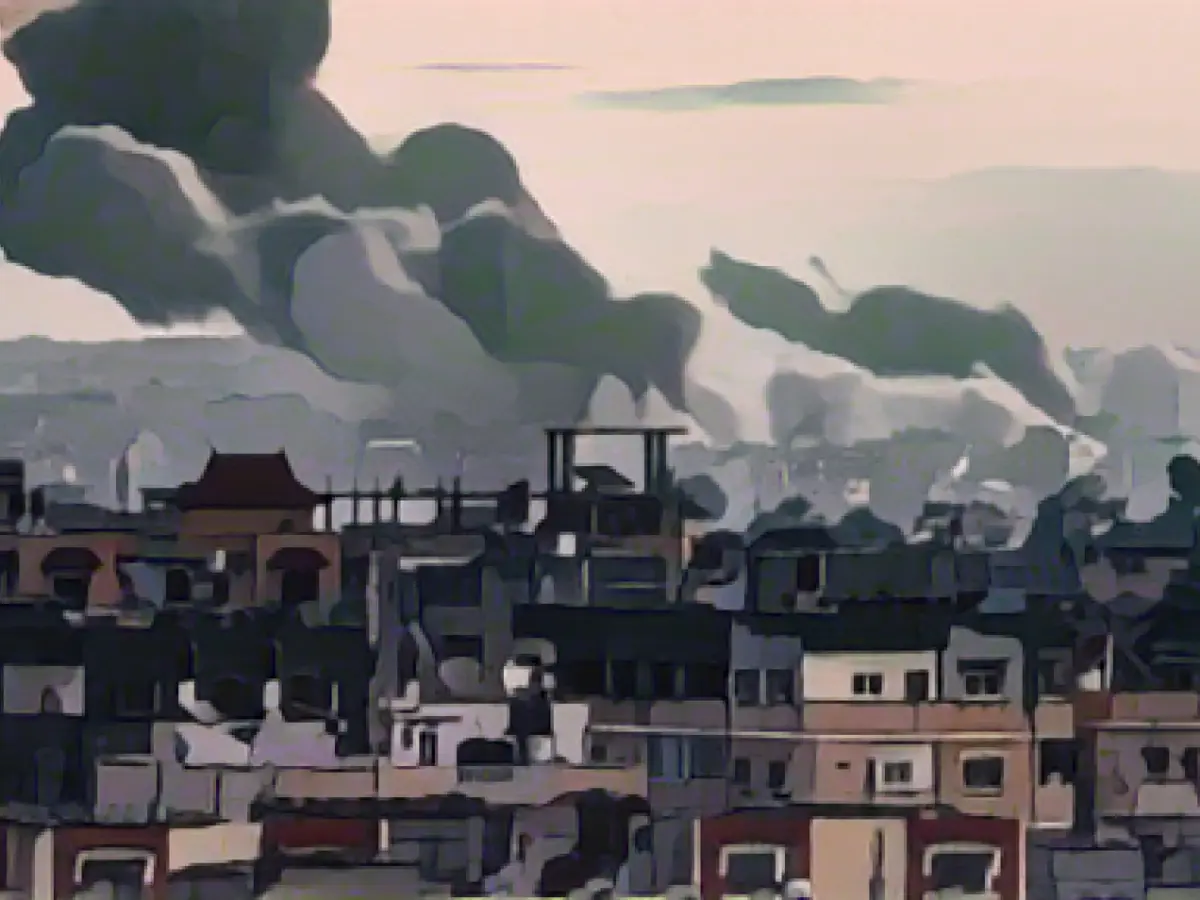Israeli army "prepared for any scenario" after killing of Hamas deputy chief
On Wednesday night, the Israeli armed forces once again took aim at targets in the Gaza Strip, including in the southern city of Rafah near the border with Egypt. According to eyewitnesses, numerous injured people flocked to the nearby Al-Najjar hospital.
According to army spokesman Hagari, the Israeli army is in a "very high state of readiness in all areas". Hagari did not comment on the deadly attack on Hamas' number two. He also did not comment on reports that an Israeli drone carried out the deadly attack on Hamas official Saleh al-Aruri in a suburb of Beirut on Tuesday evening.
"The most important thing we can say tonight is that we are and will remain focused on the fight against Hamas," Hagari said on Tuesday evening. The Israeli army "does not want to comment on information from foreign media".
Two Lebanese security representatives and Hamas had previously announced the death of al-Aruri. According to the statement, the deputy of Hamas politburo chief Ismail Haniya was killed on Tuesday along with his bodyguards in a drone attack in a southern suburb of Beirut that was attributed to Israel. The area is considered a stronghold of the pro-Iranian Hezbollah, which is allied with Hamas.
According to Hamas, two leaders of the Essedin al-Qassam Brigades, the military wing of the Islamist Palestinian organization, were among those killed. Hamas announced on Wednesday that al-Aruri's funeral is planned for Thursday in the Palestinian refugee camp of Shatila in Beirut. The 57-year-old was considered an important military strategist for Hamas and one of its leaders in the West Bank. Israel holds him responsible for planning numerous attacks.
On October 7, hundreds of Hamas fighters attacked Israel in an unprecedented attack. Around 1140 people were killed and around 250 others were taken hostage in the Gaza Strip. Israel then announced the destruction of the Palestinian organization, which is classified as a terrorist organization by the USA and the EU, and has been attacking targets in the Gaza Strip in a massive military campaign ever since.
In addition to Hamas leader Hanija, the political Hamas leader Jahja Sinwar and the main military leader Mohammed Deif are considered the masterminds behind the brutal large-scale attack on October 7. Sinwar has not appeared in public since October; like Deif, he is believed to be in the tunnel system under the Gaza Strip.
Since the beginning of the war in the Gaza Strip three months ago, Hezbollah has also been attacking Israel almost daily from southern Lebanon. The Israeli army is responding to the attacks with increased air strikes in Lebanon and Syria. So far, the fighting has been limited to the border areas in southern Lebanon. However, there is now growing international concern that the war could spread to Lebanon following the first attack on the Lebanese capital since the war began.
Hezbollah reacted to the killing of al-Aruri by saying that his "assassination" would "not go unanswered or unpunished". It would regard the "assassination of Sheikh Saleh al-Aruri" as a "serious attack on Lebanon", the Shiite militia declared.
The Lebanese head of government Nadschib Mikati spoke of an "Israeli crime". According to a statement published by his office, he accused Israel of wanting to drag Lebanon into a "new phase of confrontation".
The UN peacekeeping force Unifil in Lebanon feared "devastating consequences" of a possible escalation between Israel and Hezbollah on Wednesday: "We are deeply concerned about any possible escalation that could have devastating consequences for the population on both sides of the blue line."
Read also:
- This will change in December
- Fireworks and parties ring in 2024 - turn of the year overshadowed by conflicts
- Attacks on ships in the Red Sea: shipping companies avoid important trade route
- After wave of attacks: calls for longer-range weapons for Kiev grow louder
- The Israeli army's preparation extends beyond the Gaza Strip, as they are also "prepared for any scenario" following the killing of Hamas vice-chief Ismail Hanija's deputy in Beirut.
- The deadly attack on Hamas official Saleh al-Aruri, reportedly by an Israeli drone, took place in a suburb of Beirut, a stronghold of Hezbollah.
- The Al-Najjar hospital in Rafah, near the Gaza Strip's border with Egypt, served numerous injured individuals after the Israeli army's strike.
- The Israeli army's focus remains on combating Hamas, as expressed by army spokesman Daniel Hagari.
- The Gaza Strip has witnessed intense conflict between Hamas and Israel, with the two parties engaging in regular exchanges of fire.
- The assassination of al-Aruri has been met with strong condemnation from Hezbollah, which described it as a "serious attack on Lebanon."
- The killing of al-Aruri and the ensuing tensions between Israel and Hezbollah have raised international concerns about the potential for the conflict to spread beyond the Gaza Strip and into Lebanon.
- Lebanon's Prime Minister Nadschib Mikati denounced the "Israeli crime" and accused Israel of aiming to draw Lebanon into a new phase of confrontation.
- Hamas is planning to bury al-Aruri in the Shatila Palestinian refugee camp in Beirut, following his assassination on Tuesday.
- Hezbollah, an ally of Hamas, has threatened to retaliate against Israel for the assassination of al-Aruri, with their leader stating that they will "not let his assassination go unanswered or unpunished."
- The UN peacekeeping force in Lebanon, Unifil, has expressed concern over the potential devastating consequences of any escalation between Israel and Hezbollah along the Lebanese-Israeli border.
Source: www.stern.de







